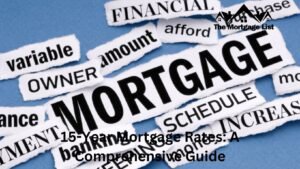Introduction to 15-Year Mortgage Rates
In today’s real estate market, understanding mortgage rates is crucial for anyone looking to buy or refinance a home. Among the various options available, a 15-year mortgage stands out for its unique advantages and considerations.
What is a 15-year mortgage?
A 15-year mortgage is a home loan that allows borrowers to repay the amount borrowed plus interest over a 15-year period. Unlike longer-term mortgages, such as 30-year loans, a 15-year mortgage typically offers lower interest rates but requires higher monthly payments.
Importance of understanding mortgage rates
Mortgage rates play a significant role in determining the overall cost of homeownership. Even a slight difference in interest rates can have a substantial impact on monthly payments and the total amount paid over the life of the loan.
Factors Influencing 15-Year Mortgage Rates
Several factors influence 15-year mortgage rates, including economic indicators, Federal Reserve policies, and market trends.
Economic indicators
Economic indicators such as inflation, employment rates, and GDP growth can influence mortgage rates. In times of economic expansion, mortgage rates may rise as demand for loans increases. Conversely, during economic downturns, rates may decrease to stimulate borrowing and spending.
Federal Reserve policies
The Federal Reserve plays a crucial role in setting short-term interest rates, which indirectly affect mortgage rates. Changes in the federal funds rate can lead to corresponding movements in mortgage rates, albeit with a lag.

Market trends
Market conditions, including supply and demand dynamics and investor sentiment, can also impact mortgage rates. For example, heightened demand for mortgage-backed securities (MBS) may lead to lower mortgage rates, while increased investor uncertainty could push rates higher.
Advantages of Choosing a 15-Year Mortgage
Opting for a 15-year mortgage offers several benefits for borrowers who can afford higher monthly payments.
Lower interest rates
15-year mortgages typically come with lower interest rates compared to longer-term loans. This means borrowers can save thousands of dollars in interest over the life of the loan.
Faster equity buildup
With higher monthly payments, borrowers build equity in their homes at a faster pace compared to longer-term mortgages. This can provide greater financial security and flexibility in the long run.
Long-term savings
By paying off the loan in half the time, borrowers can save significantly on interest payments and own their homes outright sooner. This can lead to substantial long-term savings and financial freedom.
Disadvantages of Opting for a 15-Year Mortgage
While 15-year mortgages offer numerous advantages, they may not be suitable for everyone due to higher monthly payments and limited financial flexibility.
Higher monthly payments
One of the main drawbacks of a 15-year mortgage is the higher monthly payments required to pay off the loan in a shorter period. This can strain the budgets of some borrowers, especially those with limited income or high debt obligations.
Limited financial flexibility
The higher monthly payments associated with a 15-year mortgage can limit borrowers’ ability to save for other financial goals or weather unexpected expenses. This lack of flexibility may pose challenges during periods of financial hardship.
Opportunity cost
Choosing a 15-year mortgage means committing to higher monthly payments and potentially missing out on other investment opportunities. Borrowers should carefully weigh the opportunity cost of tying up funds in home equity versus investing in other assets.
Comparing 15-Year Mortgage Rates with Other Options
Before committing to a 15-year mortgage, borrowers should consider alternative options, such as 30-year mortgages, adjustable-rate mortgages (ARMs), and balloon mortgages.
30-year mortgage rates
30-year mortgages offer lower monthly payments but typically come with higher interest rates and longer repayment terms. While they provide greater financial flexibility, they result in higher overall interest costs.
Adjustable-rate mortgages (ARMs)
ARMs start with lower introductory rates that adjust periodically based on market conditions. While they can be beneficial in a falling rate environment, they carry the risk of higher payments if rates rise.

Balloon mortgages
Balloon mortgages feature low initial payments followed by a large lump-sum payment at the end of the loan term. While they offer lower monthly payments initially, borrowers must be prepared to refinance or pay off the remaining balance when the balloon payment is due.
How to Secure the Best 15-Year Mortgage Rates
To secure the best 15-year mortgage rates, borrowers should focus on improving their credit score, maintaining a stable income, and minimizing their loan-to-value ratio.
Good credit score
Lenders use credit scores to assess borrowers’ creditworthiness and determine the interest rates offered. Borrowers with higher credit scores typically qualify for lower mortgage rates.
Stable income
Lenders prefer borrowers with stable, reliable income sources, as they are more likely to make timely mortgage payments. Having a steady job or multiple sources of income can improve borrowers’ chances of securing favorable rates.
Loan-to-value ratio
The loan-to-value (LTV) ratio measures the loan amount relative to the appraised value of the property. A lower LTV ratio indicates less risk for lenders and may result in lower interest rates for borrowers.
Current Trends in 15-Year Mortgage Rates
Understanding current trends in 15-year mortgage rates can help borrowers make informed decisions about when to buy or refinance.
Recent fluctuations
15-year mortgage rates have experienced fluctuations in response to changes in economic conditions, Federal Reserve policies, and market dynamics. Keeping abreast of these fluctuations can help borrowers time their mortgage transactions effectively.
Predictions for the future
While it’s difficult to predict future mortgage rates with certainty, economic forecasts and expert analysis can provide valuable insights into potential trends. Borrowers should consider consulting with mortgage professionals to gauge future rate movements.
Tips for Managing 15-Year Mortgage Payments
Managing 15-year mortgage payments requires careful budgeting and financial planning to ensure affordability and stability.
Budgeting strategies
Creating a comprehensive budget that accounts for all monthly expenses can help borrowers allocate funds for mortgage payments and other financial priorities.
Refinancing options
Borrowers may have the option to refinance their 15-year mortgages to lower their interest rates or extend their repayment terms. However, refinancing entails closing costs and may not always result in savings.
Financial planning for unexpected circumstances
Preparing for unexpected expenses or changes in financial circumstances is essential for maintaining mortgage affordability. Establishing an emergency fund and exploring insurance options can provide a safety net during challenging times.
Common Misconceptions About 15-Year Mortgage Rates
Several misconceptions surround 15-year mortgage rates, which borrowers should be aware of before making decisions.
Affordability concerns
Many borrowers assume that higher monthly payments make 15-year mortgages unaffordable. However, with proper financial planning and budgeting, these mortgages can be within reach for many homeowners.
Suitability for different financial situations
While 15-year mortgages may not be suitable for everyone, they can benefit borrowers with stable income, strong credit, and a long-term commitment to homeownership. It’s essential to evaluate individual financial goals and circumstances before choosing a mortgage.
Case Studies: Success Stories with 15-Year Mortgages
Real-life examples of homeowners who have successfully navigated 15-year mortgages can provide valuable insights and inspiration.
Case Study 1: John and Emily’s Journey to Debt-Free Homeownership
Case Study 2: Sarah’s Path to Building Equity and Wealth Through a 15-Year Mortgage
The Impact of Credit Scores on 15-Year Mortgage Rates
Credit scores play a crucial role in determining the interest rates offered on 15-year mortgages.
Understanding creditworthiness
Lenders use credit scores to assess borrowers’ creditworthiness and determine the risk of default. Higher credit scores indicate lower risk and may result in lower interest rates.
Improving credit scores
Borrowers can improve their credit scores by paying bills on time, reducing debt, and maintaining low credit card balances. Over time, these efforts can lead to lower mortgage rates and greater borrowing power.
Government Programs and Incentives for 15-Year Mortgages
Government-backed loan programs offer incentives and benefits for borrowers seeking 15-year mortgages.
FHA loans
The Federal Housing Administration (FHA) offers FHA loans with competitive interest rates and low down payment requirements. These loans are popular among first-time homebuyers and borrowers with limited credit history.
VA loans
The Department of Veterans Affairs (VA) provides VA loans to eligible veterans, active-duty service members, and surviving spouses. VA loans offer favorable terms, including no down payment and competitive interest rates.
USDA loans
The U.S. Department of Agriculture (USDA) offers USDA loans to low- and moderate-income borrowers in rural areas. These loans feature low interest rates and flexible credit requirements.

Risks Associated with 15-Year Mortgages
While 15-year mortgages offer numerous benefits, they also carry certain risks that borrowers should be aware of.
Foreclosure risks
The higher monthly payments associated with 15-year mortgages increase the risk of default and foreclosure, especially during periods of financial hardship or economic downturns.
Interest rate fluctuations
15-year mortgage rates are subject to fluctuations in the broader economy and financial markets. Borrowers with fixed-rate mortgages are protected from interest rate hikes, but those with adjustable-rate mortgages may face higher payments if rates rise.
The Future of 15-Year Mortgage Rates
Looking ahead, several factors may influence the future of 15-year mortgage rates, including economic conditions, Federal Reserve policies, and technological advancements in the mortgage industry.
Projected trends
Economic forecasts suggest that 15-year mortgage rates may remain relatively low in the near term, but could gradually increase as economic conditions improve and inflationary pressures rise.
Potential innovations in mortgage lending
Advancements in technology, such as online mortgage platforms and digital underwriting processes, may streamline the mortgage application and approval process, making it easier for borrowers to access competitive rates.
Conclusion
In conclusion, 15-year mortgage rates play a significant role in the housing market and offer unique advantages for borrowers seeking to build equity and save on interest costs. By understanding the factors influencing mortgage rates, comparing different loan options, and adopting sound financial strategies, borrowers can secure favorable terms and achieve their homeownership goals.
FAQs (Frequently Asked Questions)
1. Are 15-year mortgages right for everyone?
- While 15-year mortgages offer benefits such as lower interest rates and faster equity buildup, they may not be suitable for everyone. Borrowers should evaluate their financial situation and long-term goals before choosing a mortgage.
2. How do I qualify for the best 15-year mortgage rates?
- To qualify for the best 15-year mortgage rates, borrowers should focus on improving their credit score, maintaining a stable income, and minimizing their loan-to-value ratio.
3. Can I refinance my 15-year mortgage to lower my interest rate?
- Yes, borrowers have the option to refinance their 15-year mortgages to lower their interest rates or extend their repayment terms. However, refinancing entails closing costs and may not always result in savings.
4. What are the risks associated with 15-year mortgages?
- Risks associated with 15-year mortgages include higher monthly payments, foreclosure risks, and exposure to interest rate fluctuations. Borrowers should carefully weigh these risks before committing to a mortgage.
5. How can I prepare for unexpected financial circumstances with a 15-year mortgage?
- To prepare for unexpected financial circumstances, borrowers should establish an emergency fund, explore insurance options, and consider refinancing or modifying their mortgage terms if necessary.
Read More:>

